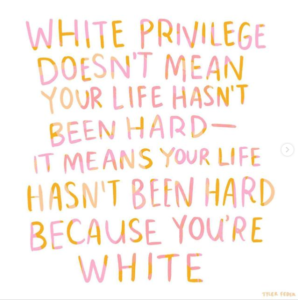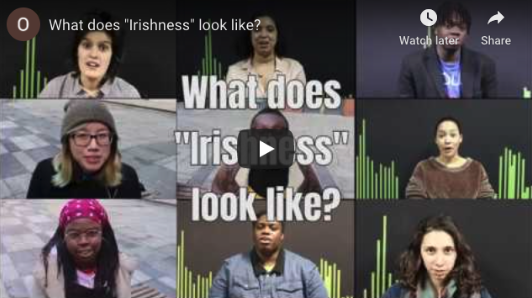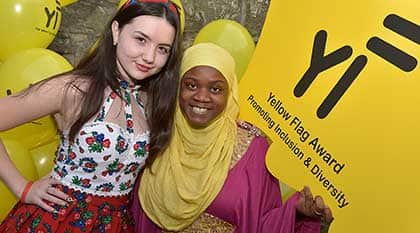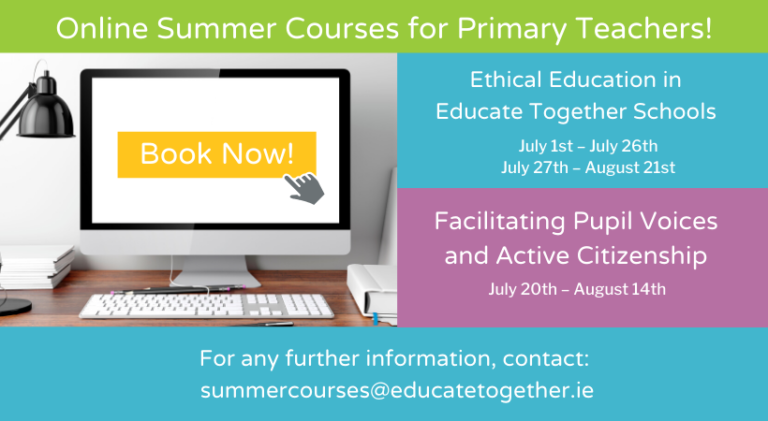(Originally published online in July 2020)
“Hi, my name is Laura and I’m privileged“ – how many conversations start this way? Very few, if any, but they should, particularly if we are about to share our opinion on something that we have little or no experience of, such as racism.
Recently, there has been increased media reporting on experiences of racism in Ireland, including in our schools. But racism is not a new phenomenon in Ireland. It’s been clear for some time that anti-racist education is important and necessary. But where to begin?
Make a commitment to anti-racist education
Anti-racism education is a continuous journey. Reading this blog or any ‘how to’ list will not equip anyone to successfully deliver anti-racist education. However, making a commitment to enhancing your knowledge and practice is a good place to start.
Taking an anti-racist journey involves reading about the history and experience of others, identifying and confronting our own biases, and having uncomfortable conversations with friends and family. The commitment to anti-racist education means going further than just not being racist in our own words and actions, but also challenging racism when we see and hear it and lending our active support to others who experience it.
- Information about racism in Ireland and advice on supporting victims of racism is available in the Irish Network Against Racism publication “Responding to Racism Guide”.
Acknowledge your privilege
This can be a difficult and challenging process. For those who experience privilege, it can be difficult to recognise it because for each of us, our experience is normal. Structural racism is embedded into the fabric of societies and is usually obscured from view. So what is privilege?
If you are a white, settled, Irish person living in Ireland, you experience privilege, even though it may not seem like it or be immediately obvious.
Does this mean you haven’t worked hard, that you haven’t suffered setbacks or that you haven’t experienced other kinds of discrimination? Absolutely not. It just means that you haven’t been subject to the additional disadvantage of someone who is treated differently because of the colour of their skin, their ethnicity or their cultural background.
John Rawls created a very simple thought experiment to help people reflect on the level of equality in society and our own privilege. You can watch a short video clip narrated by Stephen Fry about this here.
Rawls’ experiment helps to draw attention to those aspects of society that are inherently unfair but remain hidden in general because they present advantages to some – usually those who hold the most power and privilege.
Of course, white privilege is not the only type of privilege. Many of us experience privilege because of our social class or religious background, for example, or our gender, sexual orientation or age, just as many people experience discrimination because of these identifiers. And the extent to which we experience advantage or disadvantage, inclusion or exclusion, can depend on the particular context we are in, and the way we are positioned in that context.
The particular ways that a young traveller boy experiences racism in a school setting in Ireland, for example, are different to the ways a girl from a Chinese background would. Different again would be the experiences of a teacher from a Nigerian background in a school here. Gender, social class, age, religion – these all intersect with race – and we need to consider them as factors affecting both privilege and exclusion in our school communities.
This is called intersectionality, and you can watch a short clip with US Professor Kimberlé Crenshaw explaining it here.
Being aware of the ways we are privileged also means learning to be aware of our own unconscious (or implicit) biases, because these affect our expectations of our students. Starting from the understanding that bias is a universal human condition that must be recognised and managed, not a personal defect, we can start to unpack and disrupt our biased thinking.
- There are some resources for doing this here
More links to help explore privilege and its impact:
- Instagram posts explaining white privilege
- Privilege checklist
Explore different perspectives and experiences
Nigerian author Chimamanda Ngozi Adichie, has a great TED Talk called “The Danger of a Single Story”, you can watch it here.
Adichie illustrates the damage caused when we are only told one story about whole groups of people – or people we perceive to be a ‘group’. Research conducted in Irish schools shows that young people from minority backgrounds often feel pigeonholed as ‘African’ or ‘Asian’, for example, in ways that do not match their actual identities and backgrounds. This can profoundly affect their school experiences and outcomes.
This video shares the views of some young people of colour on being Irish:
One way to learn about diverse experiences is by broadening the scope of our own reading. How many books do we read that are written by Black and Minority Ethnic authors? Reading texts such as Why I’m No Longer Talking to White People about Racism and White Fragility: Why It’s So Hard for White People to Talk About Racism, can help us to better understand the power dynamics that exist in conversations about racism and our role and responsibility to occupy the space of ally and activist rather than bystander. Dr Ebun Joseph recently spoke about the importance of personal responsibility and allyship in a number of articles, here and here.
Participating in anti-racism conversations can also be an effective way of enhancing our knowledge and developing more awareness of our unconscious biases and practices.
Social media can also provide an opportunity to tap into the experiences of people from a range of ethnic backgrounds and identities living in Ireland so we would encourage you to seek out the social media accounts of users with diverse backgrounds and identities living in Ireland.
Audit your school / classroom practice
Making a commitment to anti–racism education, acknowledging our privilege and enhancing our knowledge and awareness of diverse experiences will help us with reflecting on our own practice. Our experiences influence our worldview and can make us blind to some of the things we do without thinking that may not be inclusive of all students and experiences. There are some tools that can help us to audit our classrooms and school environments:
Equality in Second-level Schools – page 65 contains a checklist to help us reflect on how we teach.
Ideally anti-racism should be addressed at school level through a whole school approach. School leaders need to examine every aspect of their practice and ask hard questions: are there people from minority backgrounds in positions of power in the school? How do we attract and include teachers from minority backgrounds? Engaging with projects like the Migrant Teacher Project and Turn to Teaching can help schools diversify their teaching staff and wider perspectives.
The Yellow Flag programme is a practical programme that supports primary and secondary schools to become more inclusive of all cultures and ethnicities and to challenge racism and discrimination. Participating in The Yellow Flag programme provides a roadmap for schools to review their practice and enhance their commitment to inclusion and diversity.
If you are in an Educate Together school, anti-racism should be integrated into your wider commitment to Ethical Education and being an equality-based school. A new Ethos School Self-evaluation (SSE) tool will be available this year to help schools evaluate their practice in this area.
As well as expanding our own reading, we need to pay close attention to the messages presented in the texts and materials we choose for use in the classroom. How many, and what kind, of experiences are featured and focused on? Do they convey a ‘single story’?
In addition to widening the variety of texts that we use, we also need to think about how we use them. Are we critical and reflective of the representations of characters in the texts we read and the textbooks we use? Do we address racist language and ideas in texts that form part of the curriculum? How do we make sure people from a range of ethnic backgrounds are represented and normalised in school events and displays – without making some seem ‘exotic’ or different? See here for an activity to do with students related to this.
Children’s Books Ireland have created a number of reading lists that can help teachers and parents explore books that represent more diverse experiences:
- Inclusivity and Representation
- Stand with Refugees campaign list
- Celebrating Difference
- Cross-currents: A guide to multicultural books for young people
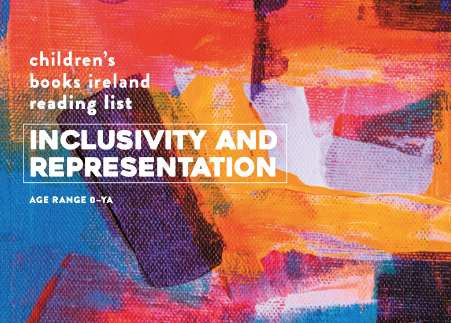
To find out about recent book publications, try reading:
- The Guardian Children’s Books Site
- Children’s Books Ireland INIS publication
- Little Island Books website
Get comfortable managing conflict
Many teachers are uncomfortable talking about racial and other inequalities in the classroom. While this is understandable, unfortunately ignoring racism, or taking a ‘colour-blind’ approach (‘I don’t see race’), just helps to maintain the status quo. While outdated theories which link ‘race’ to genetic differences have long been disproven (see article below), they still have huge influence, and simply saying race does not exist is not enough.
Taking an anti–racist approach means discussing racism in the classroom, exploring privilege, and potentially challenging some students’ worldviews and beliefs. It may lead to some heated discussions. The resources below provide guidance on how teachers can build support structures into their classrooms to manage these discussions.
They include establishing a classroom charter with agreed procedures for discussion, providing students with the opportunity to decompress and reflect during and after challenging conversations, and utilising frameworks such as school rules, the law and international Human Rights agreements to support anti–racist perspectives and practices.
Familiarising ourselves with strategies and techniques that can be employed to manage difficult conversations will help us to feel more confident and prepared to facilitate respectful discussions.
- Tackling Controversial Issues resource
- Managing Conflict and Facilitating Dialogue on Controversial Issues LITTLE online module:
- Educate Together summer courses
Mind your language
Language has power. Permitting the use of racist or discriminatory language in the classroom or school environment is extremely harmful. Policies should clearly name racist language as unacceptable, and any use by students or staff members, whether in class time or outside it, should be challenged immediately.
Language is also closely linked to culture and ethnicity, and if students’ home languages are not supported and promoted in school, this sends a powerful message about whose heritage is valued.
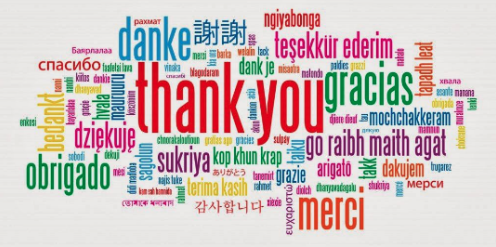
A whole school approach to linguistic diversity will involve supporting all students to develop both their home language(s) as well as the dominant language of the school (whether that is English or Irish). It will also ensure that all teachers use language aware teaching methodologies, and that English as an Additional Language teaching is planned and delivered by teachers with specific skills in the area, for as long as students need it (up to 7 years’ support is usually required to reach full academic proficiency in a second language).
School libraries should also reflect diversity and include books in a variety of languages. The School Library Home Languages Funding Scheme provides support to schools to purchase books and resources in languages other than English and Irish. See here.
Be culturally responsive
Culturally responsive teaching is an approach that challenges teachers to address their implicit biases and approach all students from a perspective of critical care. It was originally developed by black educator Gloria Ladson-Billings (you can read her blog here).
Watch Dorothy Strickland talking about being culturally responsive and valuing individual differences in this short clip.
Teaching in a culturally responsive way involves building cultural competence and empathy, holding high expectations for all students, and ensuring students from minority backgrounds feel valued and empowered.
Here are some resources for learning more about culturally responsive teaching:
- www.edutopia.org/article/getting-started-culturally-responsive-teaching
- www.understood.org/en/school-learning/for-educators/universal-design-for-learning/what-is-culturally-responsive-teaching
Apologise if you make a mistake
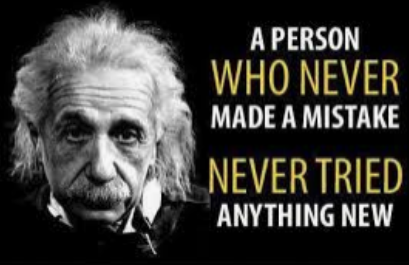
As Albert Einstein reminds us here, a person who never made a mistake never tried anything new.
Anti-racism is a continuous learning process. As with any learning journey, we may make mistakes along the way. If we make a mistake and cause offence, the most important thing for us to do is acknowledge our mistake, apologise for it and continue to try and improve our knowledge, awareness and practice. We will not be experienced anti-racism education practitioners right away but our commitment to it will ensure that our experience continues to grow.
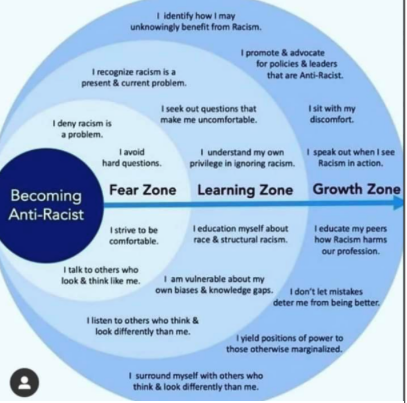
Educate Together’s summer courses
Educate Together’s summer courses are open to all teachers. ‘Ethical Education in Educate Together Schools’ includes the topics of anti-racism, intercultural education and equality and justice. You can find more information on the courses here.
This blog was put together by Laura and Emer from the Educate Together national office, both of whom have a particular interest in anti-racism. Laura’s PhD investigated the impact of intercultural education, and Emer’s explored the experiences of students from minority ethnic backgrounds in Irish post-primary schools.

